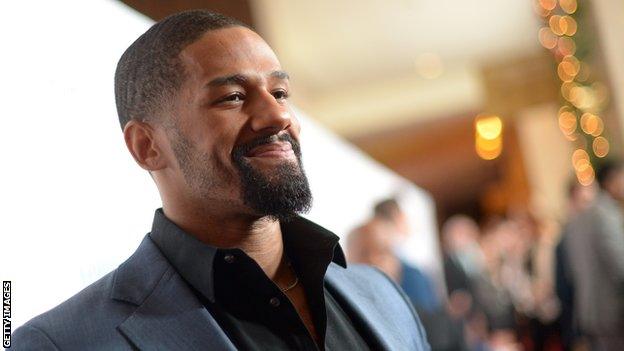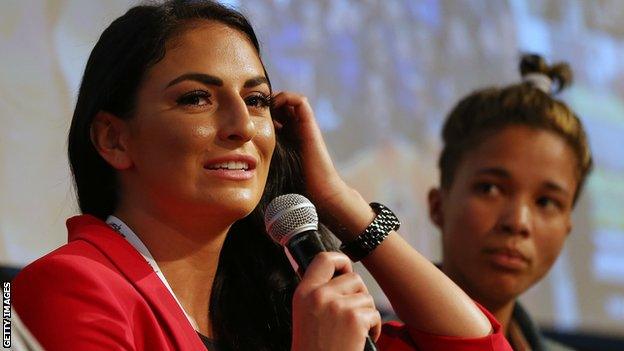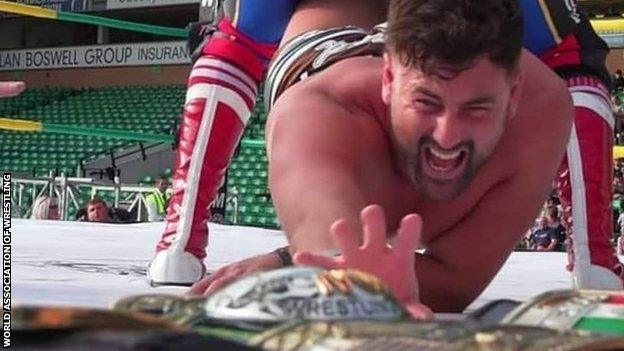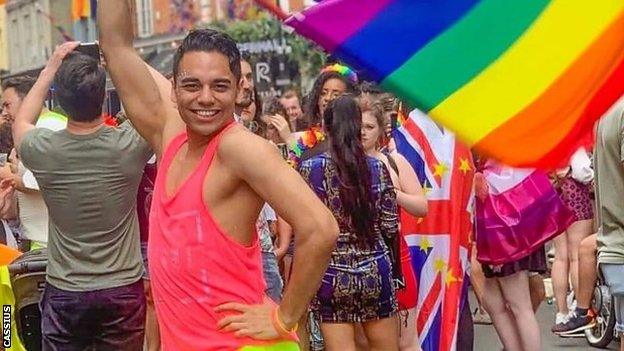Pride Month: How LGBTQ+ wrestlers have found a place in the industry
- Published

Fred Rosser spent much of his WWE career fighting under the name Darren Young
Imagine coming out to Vince McMahon.
The larger-than-life chairman of WWE (World Wrestling Entertainment) spent years playing one of the biggest 'bad guys' in wrestling, so you could forgive Fred Rosser for being a little nervous about how his then-boss would react.
"He called me, and we talked for almost 20 minutes about how he respected my decision," Rosser recalls.
"He was very kind - not only him, but others as well."
The decision by Rosser, who fought as Darren Young throughout his WWE career, to speak publicly about his sexuality made headlines in 2013.
There had been other LGBTQ+ wrestlers before him, including Pat Patterson - the legendary Canadian grappler widely respected as one of the industry's greatest minds.
But more often than not, the LGBTQ+ community was treated as a punchline by promoters and wrestlers alike.
Villainous performers knew that portraying a feminine persona with stereotypically 'gay' characteristics was a surefire way of drawing boos.
And it wasn't uncommon to hear good guys using homophobic slurs to get cheers while talking their opponent down.
'There are lots of us becoming the standard bearers'

Sonya Deville (left) is the first out female wrestler in WWE
Rosser - who now works for New Japan Pro Wrestling - helped to change the industry through his openness.
A leading wrestler's sexuality was being acknowledged on-air as both an acceptable and, more importantly, incidental part of his life.
And in the years that followed, more performers have felt comfortable being their authentic selves.
Out wrestlers such as Jake Atlas and Sonya Deville are fixtures of WWE programming, while allies like former WWE Universal Champion Finn Balor have shown their support for the LGBTQ+ community by wearing Pride-themed ring gear at major events.
The same level of visibility is on display in AEW (All Elite Wrestling) - the major new promotion started by Tony Khan, co-owner of Championship football club Fulham.
Its roster includes Nyla Rose, a transgender wrestler who has captured the AEW Women's World Championship, and Anthony Bowens, who has been turning heads as one half of 'The Acclaimed' tag team.
"It's very cool and rewarding to know you can have a positive influence on someone just by doing the thing you love", Bowens says.
"There are lots of us out there that are becoming the standard-bearers, and I think the business is moving in the right direction".
'I'm openly gay, but that's not who I am in the ring'

Brad Slayer was the first out gay man to fight for the NWA World Heavyweight Championship
In 2019 - six years after Rosser came out - there was another historic moment.
It happened at Carrow Road, as British wrestler Brad Slayer became the first out gay man to challenge for the NWA World Heavyweight Championship.
Slayer's sexuality isn't part of his wrestling persona, but he's aware of both his position as a role-model, and the progress the industry has made.
"Wrestling allows you to be someone you want to be," he says.
"I know plenty of people who are out, and it's actually helped with their careers."

British wrestler Cassius is nicknamed The Neon Explosion
Fellow Briton Cassius, who falls into that category, once tried to tone down his wrestling style because he was worried it was too flamboyant.
"I would have initially been too scared to be the character I am now," he laughs.
"But my trainer said: 'Just be you, be fabulous, and you'll do well.'
"We thought the crowd would boo me. But after five minutes they cheered, and that changed my whole life!"
'We're all here with the same goal'
In wrestling, money talks.
So perhaps the biggest indicator of how much things have changed is the growing success of events featuring predominantly LGBTQ+ performers, being produced with an LGBTQ+ audience in mind.
The most recent - named 'Fear The Gay Agenda' - took place in Florida this month.
It was headlined by a match between Parrow - who wore ring gear paying tribute to the victims of the 2016 Pulse nightclub shooting, in which 49 people were killed and 53 wounded - and EFFY, a popular competitor who also uses his social media platforms to promote inclusion in wrestling.
For him, events such as 'Fear the Gay Agenda' are not just about the in-ring action, but a chance to educate non-LGBTQ+ fans about the community.
"We have to say to them that we're performers and we're going to give them the show," EFFY says.
"But we also want them to learn about who we are, and not to feel scared about the differences we have.
"We're all here with the same goal [of enjoying wrestling] - so that's a much better way to do it."